2016 Year in Review: Another Successful Year of Peaceful Resistance
(Minghui.org) In 2016, Falun Gong's peaceful resistance to the brutal persecution marked its 17th year.
Calls from Falun Gong practitioners and their supporters for an end to forced organ harvesting in China was recognized by the international community in 2016. American and European lawmakers passed resolutions and declarations requesting that the Chinese regime put a stop to these atrocities.
Lawsuits against the former head of Communist Party continued in 2016 with Falun Gong practitioners successfully filing more than 200,000 lawsuits over the past two years. At the same time, practitioners collected millions of signatures from around the world calling on the international community to help bring the head perpetrator of the persecution to justice.
Shen Yun, the world-class performing arts group, celebrated the 10th anniversary of its founding in 2016. The four touring groups, reviving 5,000 years of Chinese civilization, held extremely successful performances. Shen Yun is debuting its fifth company this year.
However, the persecution in China still has not ended. In 2016, more than 1,000 practitioners were illegally sentenced to detention, and the Minghui website was able to confirm the identities of 92 practitioners who were killed as a result of the persecution, though the true death toll is likely much higher.
Practitioners' tireless efforts to share the principles and benefits of Falun Gong with the public is making a difference. More and more Chinese people are quitting the Communist Party, and many are taking the initiative to tell others about the Party's crimes.
Stopping Forced Organ Harvesting
The U.S. House of Representatives unanimously passed Resolution 343 on June 13, 2016. The resolution calls on China's communist regime to immediately stop forced organ harvesting from Falun Gong practitioners and other prisoners of conscience. Three international investigators, David Kilgour, David Matas, and Ethan Gutmann, released an in-depth update to their research a few days after the resolution was passed.
“China has been perpetuating perhaps some of the most gruesome and egregious human rights violations against the Falun Gong and other prisoners of conscience, yet has hardly faced any criticism, let alone sanctions, for these abuses,” said Republican Representative Ileana Ros-Lehtinen, who initiated Resolution 343. “The regime’s ghoulish and inhumane practice of robbing individuals of their freedom, throwing them in labor camps or prisons, and then executing them and harvesting their organs for transplants is way beyond the pale of comprehension and must be opposed universally and ended unconditionally.”
Similar progress was also made in Europe against the atrocities in China. Twelve Members of the European Parliament issued a joint declaration requesting that the European Parliament investigate the illegal harvesting and trafficking of human organs by the Chinese communist regime. After a special hearing on June 29, more than half of the Members of the European Parliament (MEP) co-signed Written Declaration (2016/WD48), requiring the European Parliament to take action to stop the state-sanctioned forced organ harvesting in China.
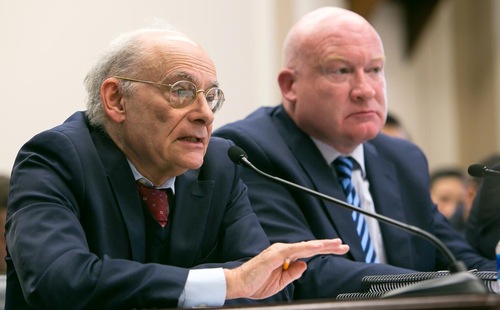 David Matas (left) and Ethan Gutmann (right) testify at a hearing titled “Organ harvesting: An examination of a brutal practice” held by the U.S. House Committee on Foreign Affairs on June 23, 2016.
David Matas (left) and Ethan Gutmann (right) testify at a hearing titled “Organ harvesting: An examination of a brutal practice” held by the U.S. House Committee on Foreign Affairs on June 23, 2016.
Increasing Support for Lawsuits Against Jiang Zemin
Since momentum started building in May 2015, at least 200,000 criminal complaints have been filed against former Chinese leader Jiang Zemin for initiating the persecution of Falun Gong. These complaints were submitted from all regions of China and from Chinese people living in 22 foreign countries.
U.S. Congressman Dana Rohrabacher expressed his support for the lawsuits against Jiang, and said that Jiang and the CCP must be held accountable for their crimes.
On October 20, 2016, New Taipei became the 13th city in Taiwan to pass a resolution supporting the lawsuits. “Forced live organ harvesting is inhuman and against the basic rights of life,” said council member Lin Chiu-hui in an interview. “Freedom of belief is a part of life. Damaging it would bring condemnation around the world.” Council member Chen Chi-neng told reporters, “I call on the Chinese government to review Jiang's crimes.”
 In addition to criminal complaints filed by Falun Gong practitioners, many ordinary Chinese citizens have shown their support by signing petitions. The Minghui website has received signatures from 7,484 people in Yueyang, Hunan Province, expressing their support for the lawsuits against Jiang.
In addition to criminal complaints filed by Falun Gong practitioners, many ordinary Chinese citizens have shown their support by signing petitions. The Minghui website has received signatures from 7,484 people in Yueyang, Hunan Province, expressing their support for the lawsuits against Jiang.
Another Successful Year for Shen Yun Performing Arts
Celebrating its 10th anniversary in 2016, Shen Yun Performing Arts had another successful year. Four touring companies traveled to 19 countries, performing a total of 408 shows in 118 cities.
 The Microsoft Theater in Los Angeles on April 24. The New York Company of Shen Yun Performing Arts presented 31 sold-out shows in eight major cities in southern California from March 19 to April 30, 2016.
The Microsoft Theater in Los Angeles on April 24. The New York Company of Shen Yun Performing Arts presented 31 sold-out shows in eight major cities in southern California from March 19 to April 30, 2016.
American actor William Baldwin saw the performance with his family in Santa Barbara and said that Shen Yun was startling and breathtaking, “We learned a lot. Of course, in Santa Barbara we have a lot of arts and culture, but we haven’t had quite an experience like that in all the years that I’ve lived here. I’ve lived here almost ten years now, so it was special for us... It was a true history lesson about the tradition of political oppression, but also artistic expression about ethnicity, about tradition. It just was a lot of grace in the performance tonight.”
Shen Yun recently premiered its fifth company, the Shen Yun North America Company, which includes some 80 dancers, musicians, singers, emcees, and technical crew. Alongside the four other companies, the new members of the Shen Yun family will tour new countries and cities in 2017.
The Shen Yun Symphony Orchestra also had an exciting year in 2016. It was the first time the orchestra journeyed to the East with tours in both Taiwan and Japan.
 The Shen Yun Symphony Orchestra debuts its Asia Tour at the Tokyo Opera City Concert Hall with a matinee performance on September 15, 2016.
The Shen Yun Symphony Orchestra debuts its Asia Tour at the Tokyo Opera City Concert Hall with a matinee performance on September 15, 2016.
Cultivation Benefits Society
Sharing cultivation experiences at conferences is a very important aspect of Falun Dafa cultivation practice. In 2016, practitioners held nearly 40 conferences in 11 European countries, five Asian countries and areas, and in both North and South America. The scale of the conferences ranged from a few hundred local attendees, such as the ones in Singapore and Queensland, Australia, to large-scale international conferences with thousands of practitioners, such as the European conference held in Munich, Germany, and the New York Fa conference.
 Group exercises after the 2nd Falun Dafa Conference for Young Practitioners in San Francisco on June 4.
Group exercises after the 2nd Falun Dafa Conference for Young Practitioners in San Francisco on June 4.
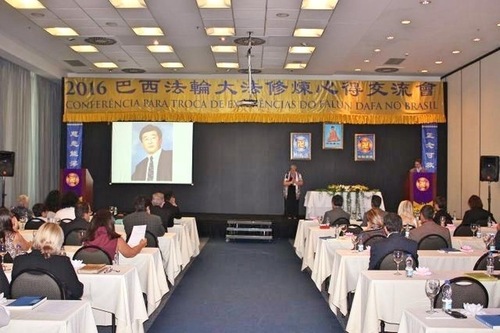 The South America Falun Dafa Conference was held in São Paulo, Brazil on October 9.
The South America Falun Dafa Conference was held in São Paulo, Brazil on October 9.
Besides improving in cultivation, practitioners continued their efforts to introduce this ancient Chinese cultivation practice to the public. Numerous free workshops were held all around the world.
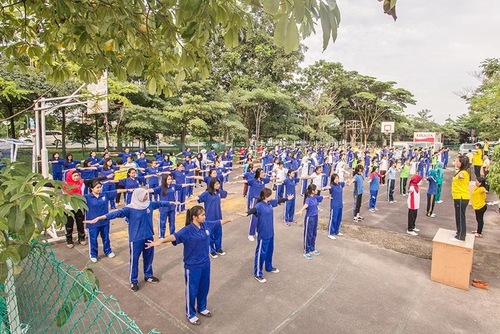 One hundred and twenty students and teachers at Batam Business School in Indonesia learned the Falun Gong exercises in August 2016.
One hundred and twenty students and teachers at Batam Business School in Indonesia learned the Falun Gong exercises in August 2016.
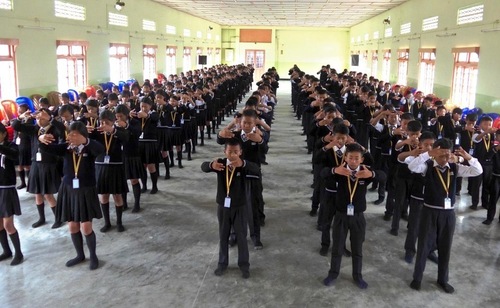 High school students in an Indian state near the Myanmar border in India learn the Falun Dafa exercises in July 2016.
High school students in an Indian state near the Myanmar border in India learn the Falun Dafa exercises in July 2016.
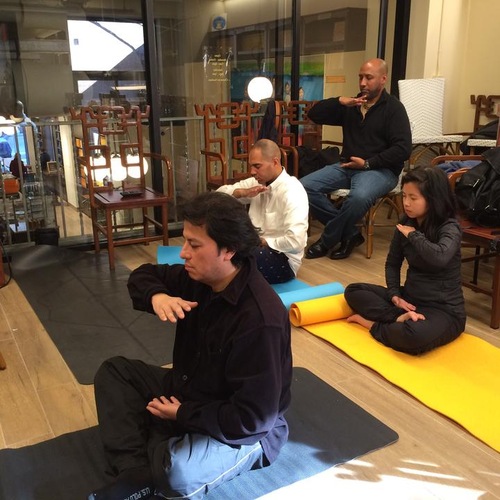 A free Falun Gong seminar held at Tianti Books in Manhattan, New York, in November 2016.
A free Falun Gong seminar held at Tianti Books in Manhattan, New York, in November 2016.
Novartis Researchers Recognize Falun Gong's Benefits in a Medical Journal
Falun Gong's amazing healing power was recognized by the authors of a paper published in the Journal of Clinical Oncology, a medical journal published by the American Society of Clinical Oncology (ASCO).
In the paper, researchers from Novartis, a global healthcare company in Basel, Switzerland, conducted a meta analysis of self-reported cases from Chinese cancer patients between 2000 and 2015 via a web platform. The authors concluded, “Falun Gong practice can help terminal cancer patients survive significantly longer, in addition to notable symptom improvement.”
The Persecution Continues
The persecution of Falun Gong in China did not stop in 2016. According to Minghui.org, 1162 practitioners were illegally sentenced by Chinese courts last year, and 92 died from severe persecution. (Chinese language links)
In just three examples, Zhao Yongsheng from Jingchuan County, Gansu Province, Jiang Deting from Liaoyang County, Liaoning Province, and Lu Zhifan from Wuchang City, Heilongjiang Province, all in their 40s and 50s, were badly beaten and subjected to other forms of physical torture after being arrested. They all passed away after being held in detention centers for a short time: Zhao in February, Jiang in June, and Lu in September.
Some Chinese Courts Refuse to Sentence Practitioners
Due to a 17-year-long peaceful resistance by practitioners and tireless efforts to explain the principles and benefits of Falun Gong to the public, more and more people in China, and especially those in government, have come to see the evil nature of the persecution. Many have begun to question blind obedience to the persecution policy.
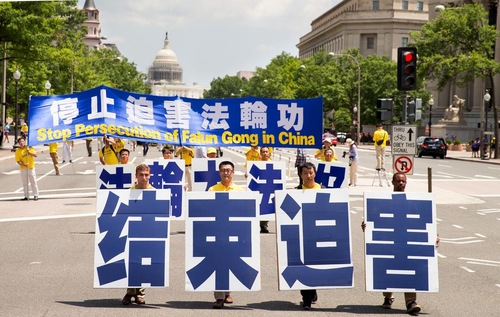 More than 1,000 Falun Gong practitioners march in Washington D.C. on July 14, 2016, to protest the persecution of Falun Gong by the Chinese communist regime. The four practitioners in front are holding a banner which reads “Stop the Persecution.”
More than 1,000 Falun Gong practitioners march in Washington D.C. on July 14, 2016, to protest the persecution of Falun Gong by the Chinese communist regime. The four practitioners in front are holding a banner which reads “Stop the Persecution.”
The Minghui.org website has reported a series of cases recently, in which Chinese prosecutors, courts, and police departments have declined to press charges against arrested Falun Gong practitioners. These cases indicate that judicial bodies and other law enforcement personnel in China are seeing past the regime's propaganda, and have even begun to help persecuted practitioners.
One Minghui reader told of how a security guard he knows became supportive of practitioners after learning the facts about Falun Gong. He no longer bothers practitioners who distribute pamphlets, and instead reads the pamphlets in detail and passes them along for others to read.
The guard was quoted as saying, “Many people who come to my office have seen the truth-clarification materials. I just want more people to know about the CCP's evildoings. The CCP should have been finished a long time ago.”
Withdrawals from the Communist Party
As of December 31, 2016, more than 260 million people have publicly renounced their memberships in the Chinese Communist Party and its affiliated organizations.
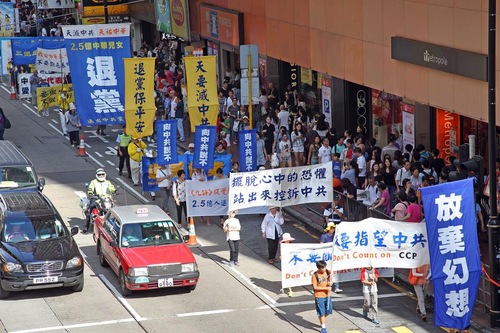 Grand march in Hong Kong on October 1 to support withdrawals from the Chinese Communist Party.
Grand march in Hong Kong on October 1 to support withdrawals from the Chinese Communist Party.